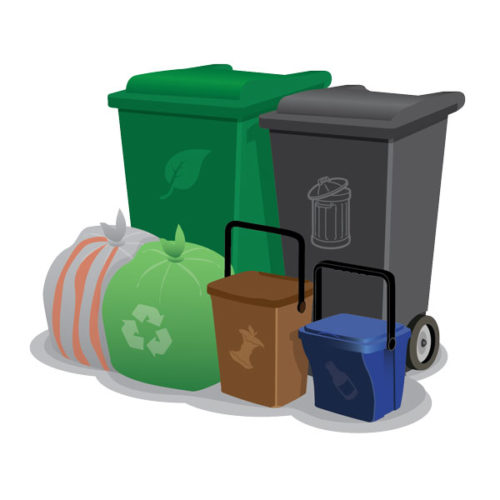Garden Waste – Know your Waste

In the third in our series helping you to “know your waste” we look at what the council will collect as “Garden Waste”
What can I put out?
Domestic Garden waste is collected fortnightly during the summer months in green bins.
Additional Garden Waste can be taken to the Household Recycling Centres all year round – but remember to book your appointment before going
Garden waste includes:
- weeds;
- grass cuttings;
- dead plants;
- leaves; and
- small twigs and branches
What should I not include?
In order to be able to process as much of your Garden Waste as possible it is important that contaminants are kept to a minimum.
- Food Waste needs to be separated from Garden Waste as although all organic matter, for hygiene reasons the Food Waste needs to be processed differently.
- Dried and/or treated wood should be disposed of in your general waste – or for larger quantities can be recycled through the dedicated skips at the Household Waste Recycling Centres – but remember to book your appointment
- Large green (fresh cut) timber
- Cardboard – whilst previously collected with Green waste, this should now be put out with your recycling.
- Shredded Paper – again this should be included for processing as recyclable materials rather than green waste
What happens to my waste once collected?
Garden waste collected at the kerbside is taken to a composting site where it is turned into a nutritious soil conditioner.
When the garden waste arrives at the composting site any material that is not compostable is removed, the remaining waste is then shredded and then laid out in a long pile to decompose, usually in the open air. This is referred to as “Open Windrow Composting”
The process at a composting site is similar to that that takes place in home compost bin, but is actively managed to speed up the process. However, due to the amount of material the temperature reached is a lot higher than in a normal household compost bin. Temperature can reach up to 60°C. This higher temperature means that the enzymes and bacteria are quickly put to work resulting in finished compost in just a few weeks.
The material is turned frequently to provide much needed oxygen to micro organisms that help decompose the material. High temperatures kill off any harmful microbes, weeds and plant diseases.
The final part of the process involves screening the compost to remove any remaining contaminants and to grade the material for various end uses. Any compost that is still oversized or hasn’t decomposed enough, can then be put back through the process until it has composted down sufficiently.
The whole process takes between 8 and 16 weeks, depending on the final use for the compost.
Read more
See the Waste and Recycling section of the Cardiff Council website
View the Council’s A-Z of Waste and Recycling to see how your items should be disposed of safely and responsibly.